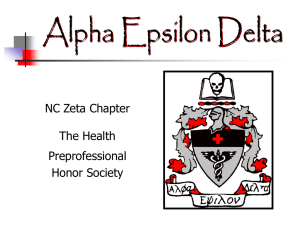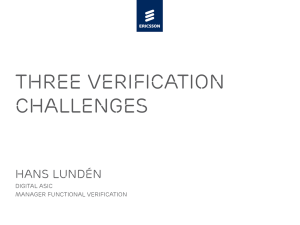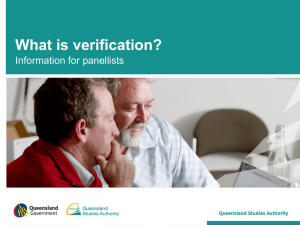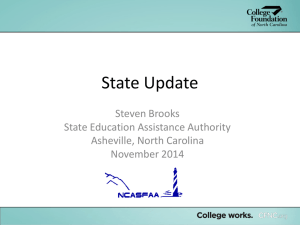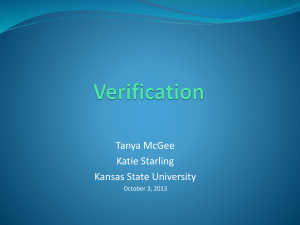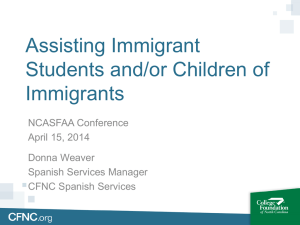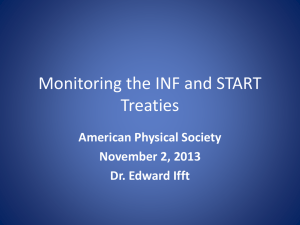State Update
advertisement
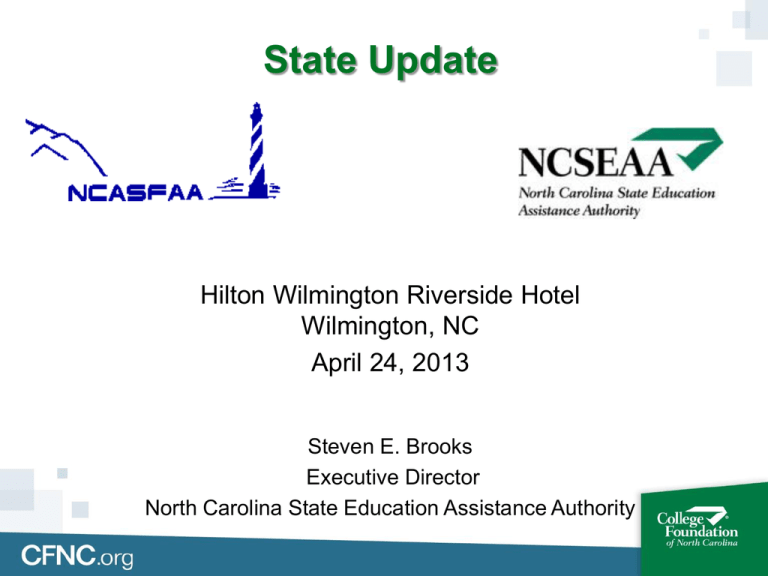
State Update Hilton Wilmington Riverside Hotel Wilmington, NC April 24, 2013 Steven E. Brooks Executive Director North Carolina State Education Assistance Authority Legislative Update • Essentially status quo funding from prior year – Community College Grant – Education Lottery Scholarship • Funding limited to recurring budget from prior year – Need Based Scholarship (Independent Colleges) – UNC Need Based Grant • Number of questions around – – – – Who is served /how they progress to degree (esp. re: UNC NBG) Remedial courses and funding them “Runners” (especially re: Community College Grant) Do campuses do enough to raise private funds for needy students? (UNC) – Appropriate role of “merit” in need based aid (all) Other issues of interest... Fate unknown • New financial aid study? • Lottery Bonus Grant? • “Opportunity Scholarship Grant” - private K-12 < 300% fed. poverty guidelines? • “Opportunity Scholarship Grant” for disabled children in private K-12? • Optometry scholarship? • Free CC tuition for students with minimum 3.0 grade point average (2015-16)? • Repeal automatic “in-state” for all full scholarship recipients at UNC • Child support to age 21 paid directly to a college if court orders? • $1 tuition increase at community colleges to support financial assistance for nonneedy students in low enrollment/high demand programs • Reinstate the tuition grant to graduates of NC School of Science and Math? • Lottery-funded CC scholarship for veterans and needy students (2 per county) • STEM Teacher Forgivable Education Loan (not FELS; “stringent academic” reminiscent of Teaching Fellows except at SEAA and for science, technology, engineering, mathematics, and special education only) Forgivable Education Loans for Service 2012-13 • 2,500 applications submitted • 1,120 new students funded under FELS program • 1,700 students renewed under former programs • Net disbursed: $16,800,000 2013-14 • 3,684 applications received • ~ 1,600 offers to students • 1,500 estimated renewals • Estimate $21.5m in disbursements 529 Update 3/31 Accounts Dollars 2012 102,642 $951 Million 2013 116,147 $1.2 Billion Increase +13.2% +25.1% SEAA Training • New Aid Administrator Training – 25th session offered in March 2013 – 36 participants – 750 Total participants trained to date • Leadership Transition – – – – – New Aid Session to be scheduled in the fall Jane Kanipe – 10 years of leadership in training Created and maintained our training materials Has moved into a new role with school services Thank you, Jane! FAFSA Day For 2013 • 4,540 students served in 100 counties • 1,720 volunteers made this possible Next Year: FAFSA Day will be February 22, 2014 – Locations in all 100 counties across North Carolina – Help from NCASFAA and SECU makes this possible THANK YOU! Robbie Schultz has led 13 FAFSA Days – since 2001 – Retiring before he has to do this even one more time Congratulations, Robbie! School Services Update Verification numbers – – – – 4 pilot campuses last year 13 schools – 11 community colleges plus 2 UNC Expect approximately 35,000 students this year Expect considerable out of state interest in 2014-2015 Why is the centralized verification service desirable to campuses? Address Institutional Challenges: Federal Verification can result in • More cost to fill seats • Lower net tuition revenue if students enroll fewer hours • Lose thousands of dollars if student does not enroll at all • FA Staff does more paperwork than assisting students • Negative perception of financial aid reflects on school • Delayed aid disbursements create financial strain on college • Extra work to monitor students’ accounts with estimated aid • Need to provide emergency loans for distressed students • Resulting difficulty in forecasting and financial projections • Avoid Institutional Liabilities Federal Verification is a large driver of liabilities in program review findings • Non-standard verification/extra documents • produces conflicting information • prolongs the process • creates liability • Insufficient technology support results in delays and errors • Errors can create school liabilities and punitive damages • Centralized verification lessens liabilities based on inconsistencies and errors AND offers insurance protection Centralized Verification Addresses Concerns • Uses standard, fully compliant (and insured) system • Verification completed more rapidly • in 5-7 days; not 18-20 averaged nationwide • Pilot schools report 50% more aid processed and available by fall registration/fee payment deadline • FA administrators reported more time with students most likely to withdraw or defer enrollment • Noticeable reduction in office visits and phone traffic during verification cycle and fall registration • Students “pleasantly shocked” by significant improvement in process and, specifically, how quickly FA funds available Additional school service to help campuses: Default Prevention/ Student Retention and Success • • • • • • Advanced services and analytics to promote student satisfaction and retention Comprehensive financial education for all students during enrollment Targeted financial education for borrowers as they leave school Regular contact with former students as their advocate in the student loan area Designed to comply with federal demands on campuses for default prevention activities Provide campus with power of 50 years experience preventing defaults Additional school services to help campuses Open to your ideas on other outsourcing 1. Streamline burdensome campus chores 2. Free staff to engage in more meaningful work 3. Benefit students with more efficient, cost-effective services 4. Achieve consistency of result CFNC Update Data for most recent 12 months ending 3/31/2013 Accounts Applications Transcripts 521,220 486,024 332,463 Average visitors to CFNC during March 2013: 10,819 per day Why the focus on CFNC in North Carolina? We KNOW a lot about the benefits of education! We also know Five Ways ED Pays Takes the many tables in the research document Education Pays 2012, and makes them simple. 1. 2. 3. 4. 5. Greater Wealth More Security Better Health Closer Family Stronger Community Short video on Five Ways For each of these Five Ways.... College Works • New marketing campaign for CFNC – – – – 33 billboards 24 television stations 44 radio stations 70 high school newspapers • New middle school landing page: – CFNC.org/Collegeworks College Works and the “Open Path” Dr. Mesmin Destin Assistant Professor, Social Psychology Northwestern University Can early info about college & how to pay influence study habits & parental support so that the path to college stays open? Experiment in two similar rooms of middle school students 1. Closed path: info on how much college costs 2. Open path: info on how much financial aid is available 3. Major increases in grades, study time, extra credit work when path is open 4. We have just made a video of Dr. Destin discussing the open path for our middle school students Mesmin Destin video Questions and Comments

